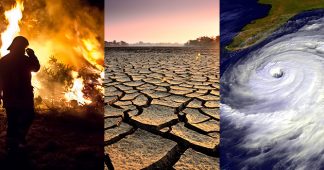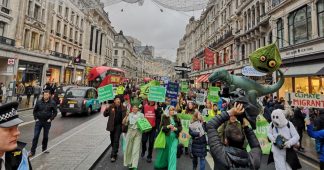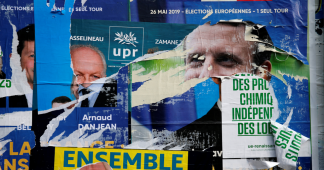Green politicians to push agenda urging climate action, social justice and civil liberties
Europe’s Greens, big winners in Sunday’s European elections, will use their newfound leverage in a fractured parliament to push an agenda of urgent climate action, social justice and civil liberties, the movement’s leaders say.
“This was a great outcome for us – but we now also have a great responsibility, because voters have given us their trust,” Bas Eickhout, a Dutch MEP and the Greens’ co-lead candidate for commission president, told the Guardian.
“Our voters, especially the younger generation, for many of whom we are now their first choice, are deeply concerned about the climate crisis, and they are pro-European – but they feel the EU is not delivering. They want us to change the course of Europe.”
Riding a surge of public concern over the climate crisis, Greens achieved double-digit scores in several countries, finishing second in Germany – where they doubled their previous score – and Finland and third in Luxembourg and France.
With their tally of MEPs surging to 70 from 51 in the last parliament, the Greens group will have roughly the same clout in the 751-seat assembly as the far-right populists led by Italy’s interior minister, Matteo Salvini – and a much better chance of using it.
The parliament’s shrinking centre-right and centre-left groups lost their longstanding joint majority in the election, meaning that along with liberal MEPs, Greens could prove critical to achieving broad pro-EU majorities to pass European legislation.
The big parties are certainly ready to talk. Manfred Weber, the conservative European People’s party’s lead candidate for commission president, said on Monday that the Greens were clearly “a possible partner. We should sit down together and draft a mandate for the next five years.”
But the Greens will have a price. “We will need to see much more serious climate action, a real change of attitude: a price on C02, properly tackling aviation, the greening of agriculture,” Eickhout said.
Under the 2015 Paris deal to limit global warming to well below 2C above pre-industrial levels, the 28-nation EU has pledged by 2030 to cut greenhouse gas emissions by at least 40% below the levels in 1990.
But scientists and activists say Europe and all other major economies must sharply raise their ambitions. The UN Intergovernmental Panel for Climate Change warned in October that warming is currently on track towards a catastrophic 3C or 4C rise.
“We will also want real progress on social protection and reducing inequality in Europe,” Eickhout added. “And we will demand far more vigorous action on the rule of law – no more playing politics. So those are the topics. We’ll talk to all who are interested in addressing them.”
Sven Giegold, a senior German MEP, confirmed the party would “insist on negotiating substance first. We aim to negotiate a pro-EU agenda in which climate change policy is front and centre – and no longer just symbolic, but concrete.”
Any cross-party agreement with Green backing would also need to include an EU policy on investment and social cohesion, Giegold said, plus an absolute commitment to tackling civil rights backsliding in EU states including Hungary, Poland, Romania, Slovakia and Malta.
“We think these election results give us a higher legitimacy to make these demands,” Giegold said. “Parliament now needs to have the time to sit down and discuss all this. We need to see more EU democracy come from this, not less.”











